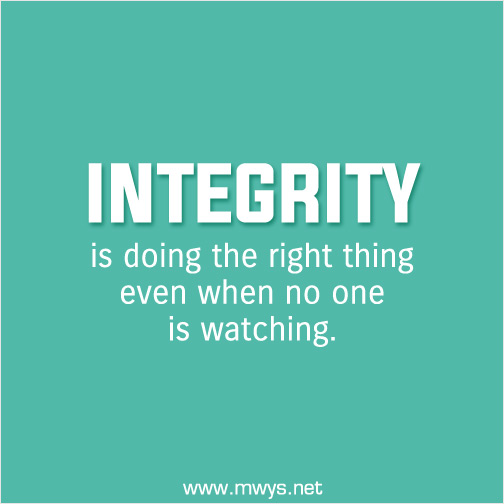
graphic © eminentlyquotable.com
“INTEGRITY is doing the right thing even when no one is watching.”
Quoted from British novelist C.S. Lewis, this may be the most precise definition of the word INTEGRITY. It is a consistent personal choice to be upright and honest, with or without the recognition of other people.
Integrity is as vague as all other virtues. Some philosophers describe integrity as doing things wholeheartedly, which means committing to one’s own priority of desires, values, and promises. As American philosopher Harry Frankfurt puts it, integrity is a product of a fully integrated self. Keeping yourself intact and uncorrupted by conflicting desires and the inconsistency of this world is said to be a manifestation of integrity.
However, while personal integrity is about being true to oneself, moral integrity is about doing the right thing unconditionally. Therefore, one can have personal integrity yet lacking of moral integrity. This can result to a person who does whatever he/she thinks fit but disregards moral consequence. While moral integrity cannot exist without personal integrity; personal integrity can be “wholeheartedly” immoral. Hence this ethical dilemma: to be morally responsible for every action or to stay true in one’s formed self-identity.
The solution may be found in considering integrity as a social virtue, argues Prof. Cheshire Calhoan of Arizona State University. She deems that real integrity can be found between moral integrity and personal integrity; that is, a person should be open to the judgements of others and be willing to question one’s own. Virtues after all are meant to elevate society, as well as the person.
😳 What Tinnitus Does To Your Brain Cells (And How To Stop It)
After 47 years of studies and countless brain scans done on more than 2,400 tinnitus patients, scientists at the MIT Institute found that in a shocking 96% of cases, tinnitus was actually shrinking their brain cells.
As it turns out, tinnitus and brain health are strongly linked.
Even more interesting: The reason why top army officials are not deaf after decades of hearing machine guns, bombs going off and helicopter noises…
Is because they are using something called "the wire method", a simple protocol inspired by a classified surgery on deaf people from the 1950s...
★ How To Get Rid Of Nail Fungus:
★ Does Your Salad Contain This Vegetable?
★ Top 10 Most Valuable Medicinal Herbs:





